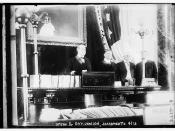Case Study - Johnson and JohnsonIn 1982 Johnson and Johnson, the pharmaceutical company that makes Tylenol announced a nationwide recall of Tylenol; they recalled 31 million bottles, which resulted in a loss of 100 million dollars. This recall was secondary to the death of seven people in the Chicago area after using Tylenol. An investigation reveled the poisoning were found to be that of an outside source. The Tylenol was contaminated with cyanide from an outside source.
Johnson and Johnson's response to the poisonings was to face the public, take responsibility, and attempt to regain the marketplace. Johnson and Johnson began a massive campaign, doling out coupons, and redesigning the package to be tamper-resistant. Because Johnson and Johnson took a stance and vowed to not only protect the consumer but also to protect the employees and the shareholders Johnson and Johnson has been able to rebuild their reputation and had regained the majority of the marketplace by the mid-80 (Nelson & Trevino, 2004).
Ethical ProblemsIn September of 1982 Johnson and Johnson's product Tylenol was tampered with and was laced with cyanide. The publicity these poisonings received created a nationwide panic and the company received thousands of anxious phone calls. Hospitals in the affected area also received an influx of frightened people who thought they may have been poisoned by the affected medicine. Johnson and Johnson responded by immediately pulling the affected medicine from shelves. They also may several statements to the public, warning people not to use any Tylenol products. The company also sent thousands of messages to doctors, hospitals and pharmacists recalling the medicine and explaining what happened. Additionally, the company took an especially proactive role in addressing the media and keeping the public informed. This incident would lead Johnson and Johnson to develop tamper...


